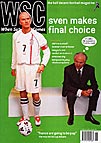 Next season the Bosnian league will finally include clubs from all parts of the fractured country. Nedim Hasic reports on the slow process of unification
Next season the Bosnian league will finally include clubs from all parts of the fractured country. Nedim Hasic reports on the slow process of unification
Next season Bosnian football will be united for the first time since the war. After the Dayton peace agreement was signed in November 1995, Bosnia became the only country in the world with three different football leagues. The Premier League, organised by the Bosnian Football Federation (BFF), was recognised by UEFA and FIFA, while the Croat-controlled part of the country maintained its own tournament, as did the “ethnically cleansed” Bosnian Serb enclave, Republika Srpska.
In 1998, under pressure from UEFA, Croat politicians allowed their clubs to join the official league. The Serbs, however, still refused to play, arguing that the situation in Bosnia was similar to Britain with its four separate leagues and insisting, in vain, on having their own representation at international level and in the European club competitions. Finally, in April, after four years of negotiations, BFF and Republika Srpska football executives finally signed a reunification agreement at UEFA headquarters in Zurich.
Before the war, several Bosnian clubs played in the Yugoslav first division, which had been won by both the main clubs in Sarajevo. Zeljeznicar, founded by railway workers in 1921, are seen as the working-class club, while FK Sarajevo have traditionally been followed by the shopkeepers and cafe owners who live in the old inner city. The best year for both was 1985, when Zeljeznicar came within five minutes of meeting Real Madrid in the UEFA Cup final, only to lose to a late away goal in their semi-final against Videoton of Hungary, while FK Sarajevo took the second of their two national titles.
The latter, probably the best ever team from Bosnia, was captained by Faruk Hadzibegic, who also led the Yugoslav national team in the 1990 World Cup. Hadzibegic became Bosnian national coach in 1999 but soon stepped down because he felt undermined by federation officials who, it was said, wanted to cap certain players in order to increase their transfer value.
When the war began, hundreds of footballers joined their countrymen in becoming refugees. Many signed for clubs in other parts of Europe but some also settled in the other former Yugoslav republics. Among the stars of the Slovenia, Croatia and Yugoslavia national teams are players who would also be qualified to play for Bosnia, like Sarajevo-born Mario Stanic, who will be with Croatia in the World Cup this summer, and Savo Milosevic, who opted for Yugoslavia.
During a brief ceasefire in 1994, the city of Zenica staged the first Bosnian championship, which was won by the local club, NK Celik. Only four teams were able to take part. Players from FK Sarajevo, including Boris Zivkovic, now with Leverkusen, and Elvir Baljic, currently on loan to Rayo Vallecano from Real Madrid, took two days to reach the venue even though it was only 40 miles away, many having arrived on foot or via lifts from army trucks.
Inevitably, the structure of the new league has become tangled up with politics. In view of the terrible financial circumstances under which most clubs operate, UEFA suggested there should be no more than 16 teams. But all the local power brokers want “their” clubs in, so the final number has yet to be agreed. Many of the businessmen who made the biggest profits from the war are involved with clubs, which have proved useful as a means of processing dirty money. Bosnian clubs are not yet permitted to be privately owned but there is one mysterious exception, FC Siroki, from a small town of only 10,000 people. Somehow, Siroki have found the funds to build a beautiful stadium with top quality training facilities, courtesy of a famous army commander, General Jelic, and his associates.
However many teams take part, there will be little quality on show. There is almost no money for transfers and the best players will be earning 20,000 Bosnian marks a year (around £7,000). The foreign exodus shows no sign of slowing down – Bosnian players have even joined clubs in Albania and Singapore.
A unified league is at least a step in the right direction and the success of players like Halim Salimihadzic at Bayern can serve as an inspiration for thousands of youngsters. But almost seven years after the war ended, football’s fate is inextricably tied up with that of the destroyed country – its future is in the hands of the politicians.
From WSC 184 June 2002. What was happening this month